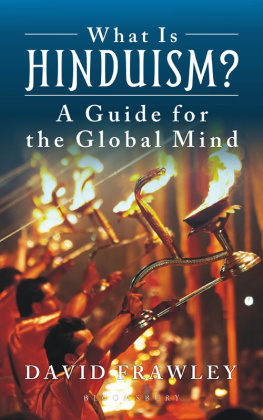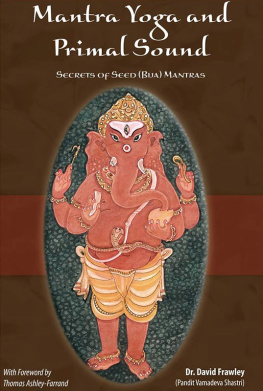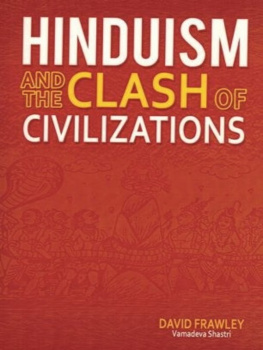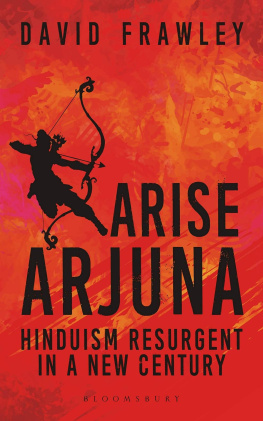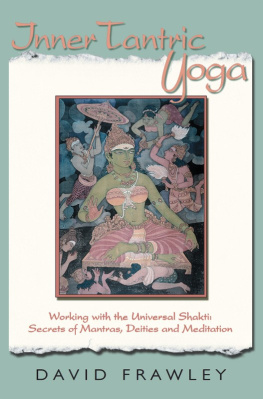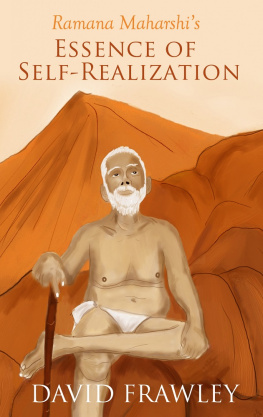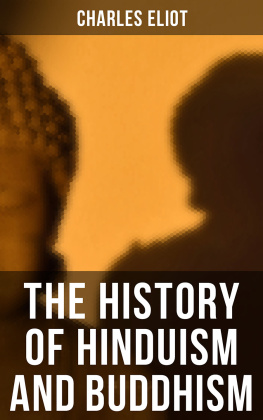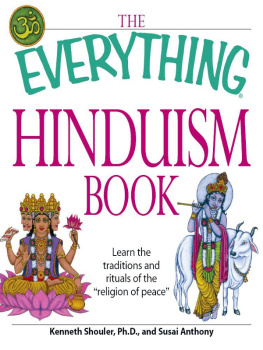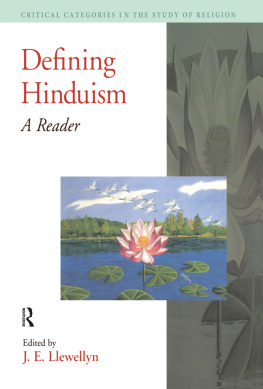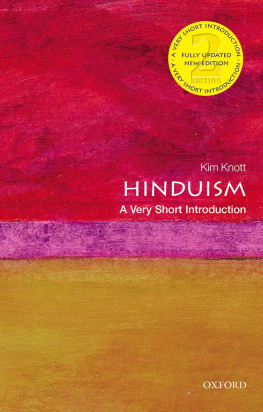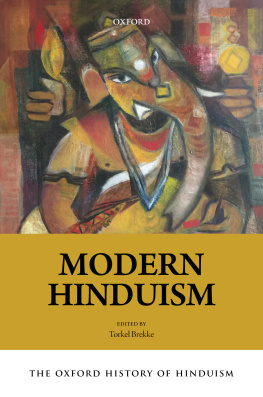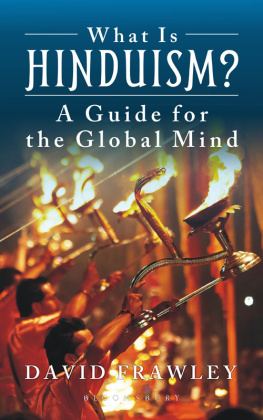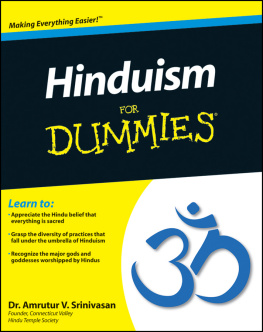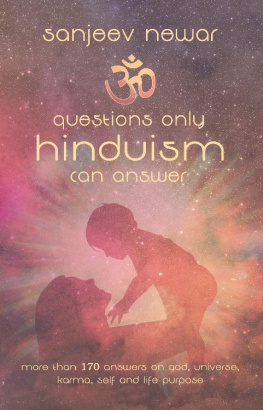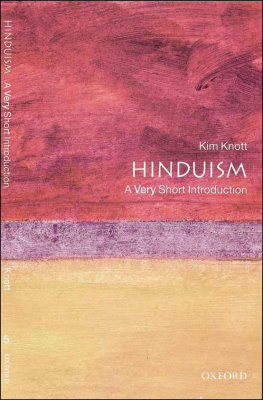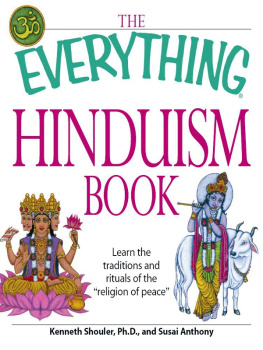What Is Hinduism?
What Is
Hinduism?
A Guide for the Global Mind
David Frawley (Pandit Vamadeva Shastri)

BLOOMSBURY INDIA
Bloomsbury Publishing India Pvt. Ltd
Second Floor, LSC Building No. 4, DDA Complex, Pocket C 6 & 7,
Vasant Kunj New Delhi 110070
BLOOMSBURY, BLOOMSBURY INDIA and the Diana logo are trademarks of Bloomsbury Publishing Plc
First published in India 2018
This edition published 2018
Copyright David Frawley (Pandit Vamadeva Shastri), 2018
David Frawley (Pandit Vamadeva Shastri) has asserted her right under the Indian Copyright Act to be identified as Author of this work
All rights reserved. No part of this publication may be reproduced or transmitted in any form or by any means, electronic or mechanical, including photocopying, recording, or any information storage or retrieval system, without prior permission in writing from the publishers
Bloomsbury Publishing Plc does not have any control over, or responsibility for, any third-party websites referred to or in this book. All internet addresses given in this book were correct at the time of going to press. The author and publisher regret any inconvenience caused if addresses have changed or sites have ceased to exist, but can accept no responsibility for any such changes
ISBN: TPB: 978-9-3880-3863-8; eBook: 978-9-3880-3865-2
2 4 6 8 10 9 7 5 3 1
Created by Manipal Digital Systems
Bloomsbury Publishing Plc makes every effort to ensure that the papers used in the manufacture of our books are natural, recyclable products made from wood grown in well-managed forests. Our manufacturing processes conform to the environmental regulations of the country of origin.
To find out more about our authors and books visit www.bloomsbury.com and sign up for our newsletters

Content

I still remember the occasion when I first came across Dr Frawleys book on Hinduism, now expanded in a new edition called What Is Hinduism: A Guide for the Global Mind.
It was 2004. I had just met my guru. Being a young seeker, my mind was full of queries related to culture, religion and spirituality.
Like the majority of middle-class Hindus, my schooling was conducted in English. In India, this means looking at the world through the Western intellectual paradigm. Though it did broaden my understanding of the world through science, there was nothing in my education which encouraged me to explore the issues pertaining to my own culture and civilization.
One area of enquiry where my education left me with more questions than answers was religion. Sometimes, religion was portrayed as a harbinger of peace, love and freedom; as a force of harmony and cooperation. But more often, it was depicted as a force of violence and pure evil, which led to the greatest, bloodiest and cruelest wars that humanity has ever known.
If the portrayal of religion left me confused, the depiction of Hinduism left me even more perplexed. Where does it stand on this spectrum of good and evil? Does it have any place in the modern world of science and technology? Or, is it just like any other religion?
In Western intellectual discourse, Hinduism is often associated with a belief in something unseen, miraculous and supernatural; that it demands faith and scorns reason and rational logic. Hinduism is portrayed as steeped in stultifying ritualism and abstruse metaphysics. It is depicted as the most primitive form of religion. Hindus are often depicted as worshippers of ghosts, goblins and a whole array of supernatural creatures. Most commonly, Hinduism is identified with the caste system which is alleged to have institutionalised the worst form of slavery.
Paradigm Shift
This was my frame of mind when my guru gifted me David Frawleys monumental work on Hinduism. It was a life-changing experience for me. It threw my confused worldview into a tailspin, ultimately organizing it, sifting the wheat from the chaff. It cleansed me of many misconceptions and helped me gain a deeper and truer understanding of Hinduism.
It was only later on that I realised that I was not alone in my quest. Millions of young Hindus had similarly been trying to understand Hinduism. For such seekers, Frawleys grand exposition on Hinduism has become a standard guide.
In Frawleys writings, Hinduism no longer remains a random collection of cults, ridden with primitive rituals and superstitions. It becomes an organic religion, unfolding and evolving in various branches on its own, without any external imposition or commandment.
Hinduism turns out not as a religion propagating a set of beliefs. Nor is it a matter of faith, demanding absolute surrender to an unquestioned dogma. Hinduism is a system of inquiry leading to the universal tradition of inner knowing. It is a quest for understanding the nature of things and how they really work. In fact, it seems to be closer to science than religion.
It became quite clear to me that the very term Hinduism is a misnomer. It is no ism or ideology. It is not a creation of the human mind. It is a complete way of life, rooted in cosmic intelligence, leading us all to live in harmony with nature and ones own Self. It is a search for the eternal and immutable truth which is beyond all thoughts, opinions and beliefs.
More importantly, I realised that Hinduism can be better understood only from the perspective of Santana Dharma or dharma. The word dharma unfolded many layers of meaning and took me to the essence of Hinduism. The quest for understanding dharma is a quest to explore the most sublime aspect of our existence and life.
Unfortunately, this deeper understanding of Hinduism is not common, even among Hindus. It might look strange to outsiders, but a majority of Hindus find it hard to answer simple questions such as: What is Hinduism? What does it actually stand for? What is its core principles?
This, as Frawley states, brings us to a paradox.
On one hand, Hinduism is one of the oldest religions in the world with a literature larger than any other religions. It has a glorious heritage of the most continuous, comprehensive and cumulative knowledge system in the world. It is the largest of the non-Abrahamic religions and the third largest religion after Christianity and Islam, with over a billion followers.
On the other hand, a majority of Hindus have lost the art of decoding their own spiritual tradition. They can explain a few aspects of Hinduism like Yoga or Ayurveda, but are unable to clearly articulate what Hinduism stands for.
Frawley resolves this paradox by tracing it back to its proper historical context. Prior to the advent of British rule, India had one of the finest education systems in the world. There was a decentralised network of institutions, consisting of schools in every nook and corner of the country. However, colonial education destroyed this traditional order and undermined the rights of Hindus to define themselves and their tradition.
Moreover, in the name of secular education, Indias great gurus were delegitimised in the newly institutionalised education system. Similarly, ashramas (traditional schools), which had been successfully transmitting traditional knowledge from one generation to another, were either ignored or marginalised. This led to a complete disconnect of the saints from mainstream academic scholarship. As a result, the original practitioners and inheritors of Hinduism, who could provide an insiders perspective, were completely replaced in mainstream academia in the name of modernity, objectivity and rationality.
Next page
